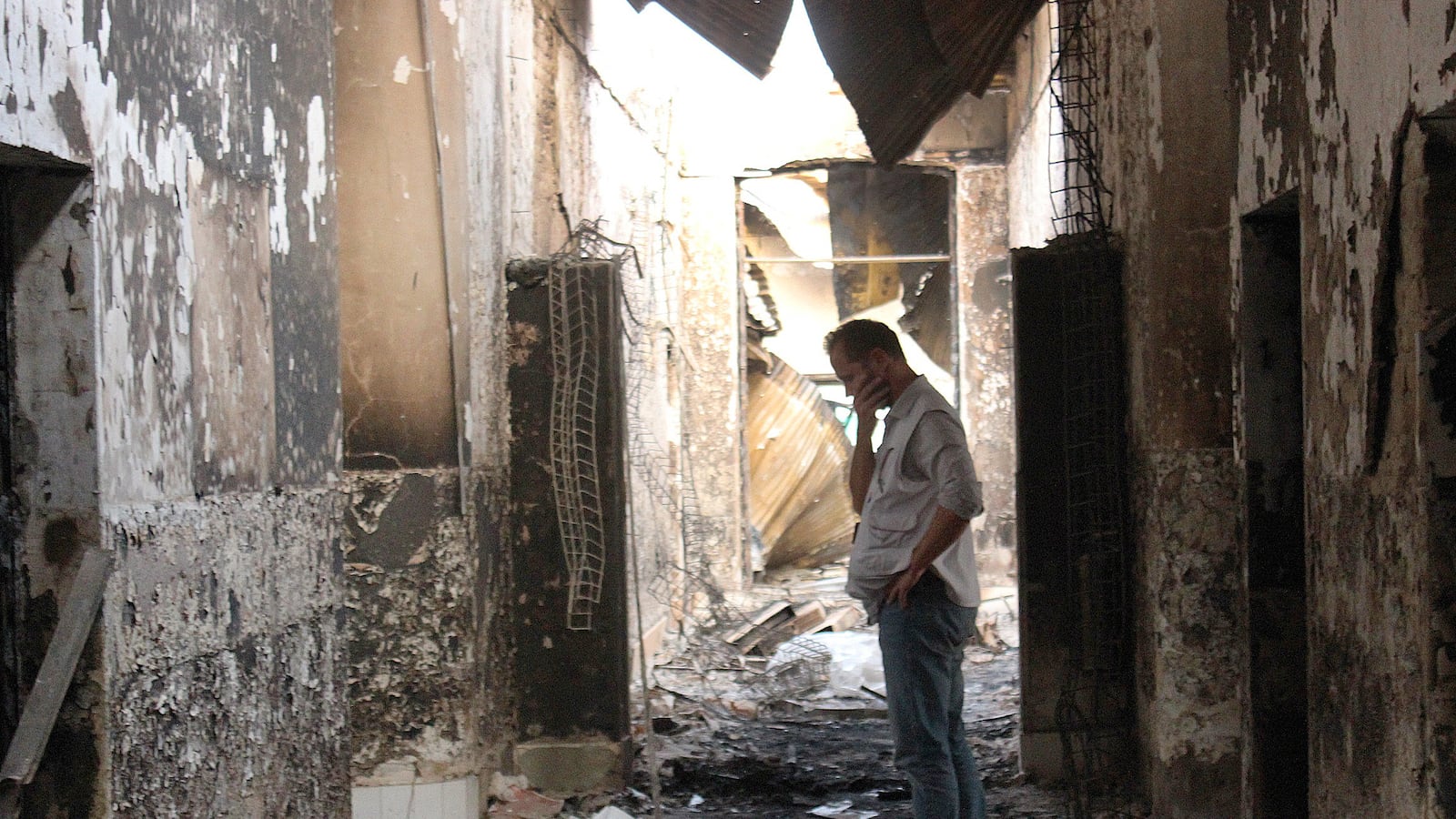Dozens of innocents were killed. But no one in the U.S. military is expected to face court-martial for the Oct. 3 bombing of a Afghan hospital that ended the lives of doctors, patients. and support staff, a defense official told The Daily Beast.
The military has concluded that the mistaken attack on a Doctors Without Borders hospital in the northern Afghan city of Kunduz was the result of a “series of errors” and not “willful misconduct,” and therefore should not lead to charges, the official said.
Instead, fewer than 20 military personnel have received a letter of reprimand, which indicates wrongdoing but stops short of calling for formal charges. Such letters, even if they don’t lead to charges, often are career-ending, as they are forever a part of a service member’s record.
For some in the military, the decision not to charge someone is a baffling result. The attack is considered one of the most egregious mistakes by the U.S. military in recent years. According to Doctors Without Borders, the attack is believed to have killed 42 people; at least another 30 were injured.
The military has repeatedly delayed releasing its report on the attack, known as a 15-6, though the document could offer detailed insights on how the attack unfolded. One defense official told The Daily Beast the 15-6 will not be released for at least three more weeks.
The 15-6 now sits with Army Gen. Joseph Votel, the newly minted commander of U.S. Central Command, and with Army Gen. Raymond Thomas, the new Special Operations commander. There is a slim, but unlikely, chance that someone could face court-martial should Votel or Thomas push for military charges but, so far, there is no indication of that.
In fact, there are indications in the other direction. Central Command officials told The Daily Beast the report on the Kunduz hospital bombing currently is being redacted where needed for eventual public release. Why release a report if charges are coming?
The “individuals most closely associated with the incident have been suspended from their duties and were referred for administrative action. Some individuals were removed from theater,” Navy Cmdr. Kyle Raines said in a statement provided to The Daily Beast. “In meantime, the investigation and subsequent report have been completed and the report is in the process of undergoing a security review and redaction for eventual public release.”
The decision not to explain, six months later, how a “series of errors” led its forces to mistakenly attack a hospital adds to speculation that the military is purposely keeping facts from the public. The military’s initial investigation concluded that the attack was the result of a perfect storm of mistakes, including the “loss of electronic communication systems on aircraft, the nature of the planning and approval process employed during operations at Kunduz city and the lack of a single system to vet proposed targets against a no-strike list.”
In November, Gen. John Campbell, then commander of the U.S. effort in Afghanistan, released those findings, which also said the attack “was the direct result of avoidable human error, compounded by process and equipment failures.”
Regardless, Doctors Without Borders has repeatedly pushed for the 15-6 so it can draw its conclusions about what happened. The organization has even attempted to conduct its own investigation, but the U.S. military so far has not formally responded to its request. Sandra Murillo, media relations manager for Doctors Without Borders, told The Daily Beast on Wednesday that her organization has not been told when the report will be released. The military has provided the organization with a summary of its findings but not the full report.
“Regardless of what new information the report may contain, we need clear reassurances from all parties to the conflict that our staff, patients and medical facilities will be safe from attack in the future,” Murillo said in a statement.
The assault began when Afghan forces told their American counterparts that they were under Taliban attack from a facility that turned out to be a hospital, which had operated in Afghanistan for years. Until the hospital bombing, U.S. officials insisted they only deployed air power when U.S. troops were endangered or to stop a terrorist attack. Yet neither threat appeared to apply in the assault in Kunduz.
American officials said they did not know the site was a hospital—even though military mapping systems should have identified the site as such. Moreover, such air assaults usually don’t take place unless an American service member can see the attack’s target; in this case, U.S. Special Forces were half a mile away, officials have said.
And as The Daily Beast reported, in the run-up to the assault, even some of the pilots on the AC-130 gunship that hit the hospital wondered if the attack was appropriate, according to an audio recording recovered from the aircraft.
Doctors Without Borders said the air assault on its facility continued 30 minutes after it alerted American military officials based at headquarters in Kabul that the hospital was wrongly under attack.
Campbell implied during his Senate testimony days after the attack that the American rules of engagement were at least part of the problem. Moreover, U.S. forces were not completely familiar with Kunduz; they had entered the city only a week prior after much of Kunduz fell under the Taliban’s control.
In its preliminary investigation, the military conceded many of those mistakes and added that “fatigue and high operation tempo” were also factors. But the department has stopped short of explaining how so many mistakes could happen in the 14th year of the U.S. war effort in Afghanistan.
In the initial hours after the attack, U.S. officials called the hospital “collateral damage,” setting a tense tone between Doctors Without Borders, the Afghans affected, and the U.S. military.
The aftershocks of the attack reverberate today. As recently as last week, Afghan forces were making changes to the rules of engagement because of lessons learned during the September fall of Kunduz to Taliban forces.
And while the U.S. military said it has made changes as well, it has not specified the extent of them. It has, however, repeatedly asserted that it is confident such a mistake will not be repeated.
“This was a tragic mistake,” Campbell said in November. “U.S. forces would never intentionally strike a hospital or other protected facilities.”






